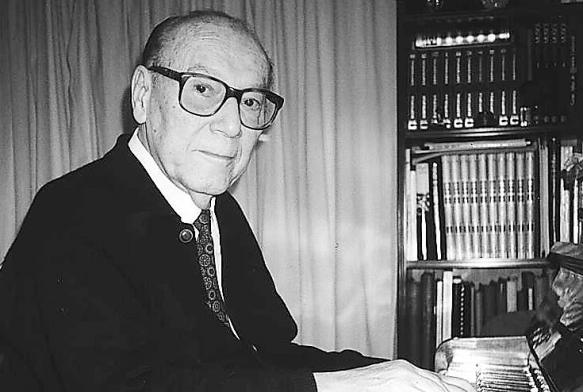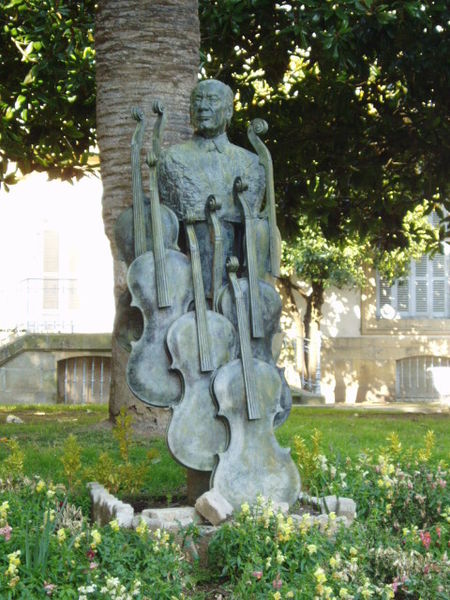<Back to Index>
- Microbiologist Salvador Edward Luria, 1912
- Composer Goizueta Francisco Garcia Escudero, 1912
- 1st President of the Republic of Cyprus Makarios III (Michail Christodoulou Mouskos), 1913
PAGE SPONSOR


Goizueta Francisco Escudero Garcia (also known as the Master Squire), Basque composer (San Sebastian , 1912 - San Sebastian, 2002).
Born in San Sebastián (Guipúzcoa), on August 13, 1912. He began his musical studies at the Municipal Academy of Music in San Sebastian with Pagola Beltran, and continued in Madrid, where he studied Composition with Conrado del Campo. Having received a fellowship from the Diputación de Guipúzcoa and the Real Academia de Bellas Artes de San Fernando, he moved to Paris for further training with Paul Dukas and Paul Le Flem, and later in Munich as a student of Albert Wolf.
In 1937 obtained the National Prize of Fine Arts for his work bucolic trio. During the Spanish Civil War he moved to France, returning to Spain at the end of it.
In 1945 he settled in Bilbao, where he was appointed director of the Coral de Bilbao and organized its orchestra. In 1947 he won first prize at the Falla Tribute Contest with his work Basque Brushstrokes, a concerto for piano and orchestra. In 1948 he moved back to his residence in Zarauz, where he had spent his childhood, having being appointed to the Chair of harmony and composition at the Conservatory of San Sebastian, replacing his former teacher Pagola Beltran. In 1957 he obtained the National Prize of Music, in a time of his activity as a composer that is dedicated to the symphonic poems: Arantzazu, Evocation in Itziar. In 1960 he created the orchestra of the city of San Sebastian. He composed the opera Zigor of Basque, which opened in Bilbao and then in Madrid and in San Sebastian with great success, obtaining again a National Music Award.
Among his most notable works are: Concerto for cello and orchestra, Sinfonia sacra, toneme (for solo piano, composed by order of the Ministry of Culture to mark the birth of Centari Joaquin Turina), Fantasy geosinfónica or opera Guernica, commissioned by the Bilbao Choral Society and premiered in 1987 during the commemoration of the fiftieth anniversary of the bombing of Guernica.
In recent years his works have been performed by, among other groups, the Bilbao Symphony Orchestra and the Orquesta Sinfónica de Galicia.
Currently his family is focused on publishing his previously unpublished works, and ensuring his lasting legacy.
According to critics, the work of Escudero has enough elements to be considered one of the most valuable of the twentieth century. The cultural situation was not favorable for many years in Spain, and the lack of any significant classical musical culture in the last part of the century have prevented the widespread dissemination of musical works that in other European countries would have enjoyed great success and momentum.
As a teacher, he directed the Municipal Conservatory of Music in San Sebastian. In this period, the historic conservatory was one of the highest regarded for music studies in Spain. His students include Javier Jacinto, José Luis Marco, Lazkano Ramón, Ángel Illarramendi, Alberto Iglesias, and most of the faculty of the Conservatory of San Sebastian and other musical centers in Spain.
He died in June 7, 2002. Posthumously, the city of San Sebastian gave his name to a city park. In 2004 the Music Conservatory of San Sebastian changed his name, adopting that of Escudero Francisco Conservatory.